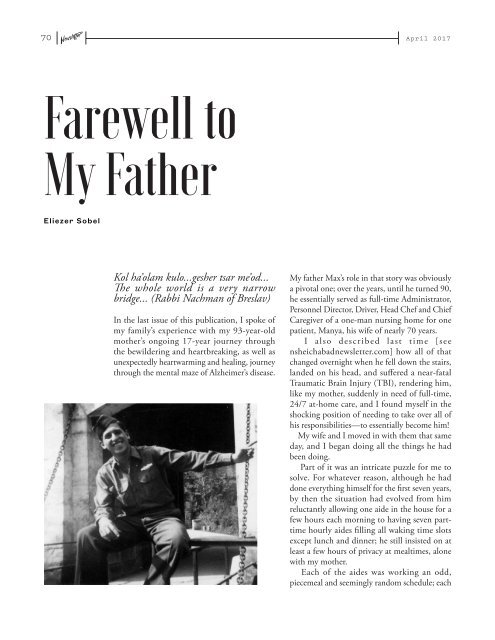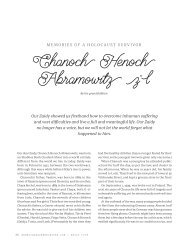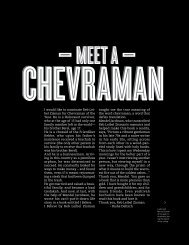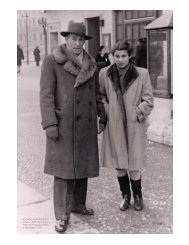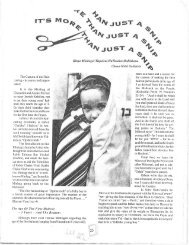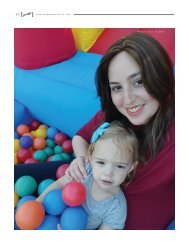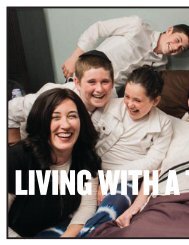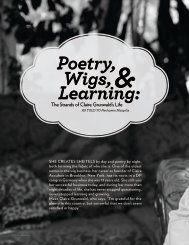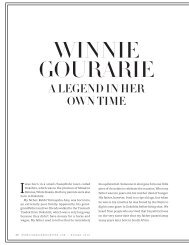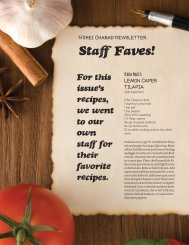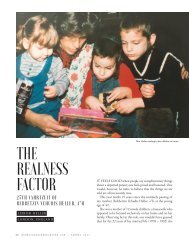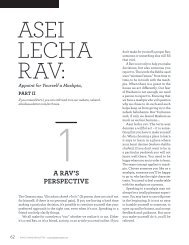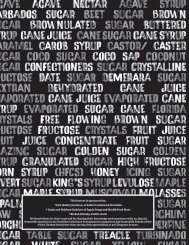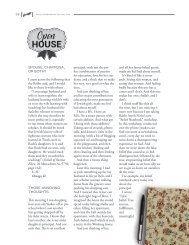Farewell to My Father, by Eliezer Sobel
- No tags were found...
Create successful ePaper yourself
Turn your PDF publications into a flip-book with our unique Google optimized e-Paper software.
70 April 2017<br />
<strong>Farewell</strong> <strong>to</strong><br />
<strong>My</strong> <strong>Father</strong><br />
<strong>Eliezer</strong> <strong>Sobel</strong><br />
Kol ha’olam kulo...gesher tsar me’od...<br />
The whole world is a very narrow<br />
bridge... (Rabbi Nachman of Breslav)<br />
In the last issue of this publication, I spoke of<br />
my family’s experience with my 93-year-old<br />
mother’s ongoing 17-year journey through<br />
the bewildering and heartbreaking, as well as<br />
unexpectedly heartwarming and healing, journey<br />
through the mental maze of Alzheimer’s disease.<br />
<strong>My</strong> father Max’s role in that s<strong>to</strong>ry was obviously<br />
a pivotal one; over the years, until he turned 90,<br />
he essentially served as full-time Administra<strong>to</strong>r,<br />
Personnel Direc<strong>to</strong>r, Driver, Head Chef and Chief<br />
Caregiver of a one-man nursing home for one<br />
patient, Manya, his wife of nearly 70 years.<br />
I also described last time [see<br />
nsheichabadnewsletter.com] how all of that<br />
changed overnight when he fell down the stairs,<br />
landed on his head, and suffered a near-fatal<br />
Traumatic Brain Injury (TBI), rendering him,<br />
like my mother, suddenly in need of full-time,<br />
24/7 at-home care, and I found myself in the<br />
shocking position of needing <strong>to</strong> take over all of<br />
his responsibilities—<strong>to</strong> essentially become him!<br />
<strong>My</strong> wife and I moved in with them that same<br />
day, and I began doing all the things he had<br />
been doing.<br />
Part of it was an intricate puzzle for me <strong>to</strong><br />
solve. For whatever reason, although he had<br />
done everything himself for the first seven years,<br />
<strong>by</strong> then the situation had evolved from him<br />
reluctantly allowing one aide in the house for a<br />
few hours each morning <strong>to</strong> having seven parttime<br />
hourly aides filling all waking time slots<br />
except lunch and dinner; he still insisted on at<br />
least a few hours of privacy at mealtimes, alone<br />
with my mother.<br />
Each of the aides was working an odd,<br />
piecemeal and seemingly random schedule; each
71<br />
Opposite: Max<br />
<strong>Sobel</strong>, World War<br />
II hero.<br />
Left: Max <strong>Sobel</strong>,<br />
lighting the Chanukah<br />
menorah<br />
with his children,<br />
Harry (L) and<br />
<strong>Eliezer</strong>.<br />
Above: Manya<br />
<strong>Sobel</strong>, young wife<br />
and mother.<br />
had a different payday and a different hourly<br />
wage; and for no obvious rhyme or reason, he had<br />
been using four distinct checking accounts <strong>to</strong> pay<br />
them! The details of this intricate system, I was<br />
soon <strong>to</strong> discover, were mostly s<strong>to</strong>red in his nowinaccessible<br />
head, as I searched his desk drawers<br />
and file cabinets for clues. It was both perplexing<br />
and amusing, but most of all, awe-inspiring. I<br />
simply couldn’t believe what Dad was up <strong>to</strong>, all<br />
that he was overseeing on his own at age 90.<br />
What followed was three years of my wife Shari<br />
and I managing both of their care, living with<br />
them for the first ten months, during which I<br />
found myself sleeping in my childhood bed again<br />
after more than three decades. (Same pictures<br />
on the wall!) We were thankful that although<br />
Mom continued on her slow but inexorable<br />
decline in<strong>to</strong> the netherworld of Alzheimer’s, my<br />
Dad’s dementia was caused <strong>by</strong> an injury <strong>to</strong> the<br />
brain, not a disease, so there was some hope for<br />
improvement over time, although the doc<strong>to</strong>rs<br />
advised us <strong>to</strong> call hospice and say our good-<strong>by</strong>es.<br />
Yet my father actually made a fairly remarkable<br />
comeback and recovered perhaps 75% of his<br />
mental/physical faculties, although he would<br />
never again be without an aide at his side 24<br />
hours a day, a situation he objected <strong>to</strong> strenuously,<br />
but we had no choice; he was an extremely high
72 April 2017<br />
fall risk (a broken back from a bathroom fall<br />
preceded the stairs incident) and he was not the<br />
least bit aware that he couldn’t simply get up<br />
and walk on his own without keeling over. He<br />
was actually kicked out of one rehab because he<br />
kept trying <strong>to</strong> get up on his own and scared the<br />
heck out of everyone there. They pleaded with<br />
us <strong>to</strong> take him home.<br />
It was a difficult and trying transition. Imagine<br />
going from being the au<strong>to</strong>nomous head of your<br />
household and caregiver for your wife <strong>to</strong> literally<br />
having everything done for you <strong>by</strong> someone else,<br />
in addition <strong>to</strong> having every move you make be<br />
moni<strong>to</strong>red and joined <strong>by</strong> another. That would<br />
drive anyone batty. Then the final indignity of<br />
having <strong>to</strong> leave the bathroom door open enough<br />
so that someone can keep an eye on you and then<br />
help you in very intimate ways.<br />
<strong>My</strong> father eventually settled in<strong>to</strong> his new and<br />
sudden change of circumstances, and he actually<br />
began <strong>to</strong> really like and enjoy having the aides<br />
around, because when it was only him and Mom,<br />
he no longer had anyone <strong>to</strong> talk <strong>to</strong> at home.<br />
Most important, throughout his entire ordeal<br />
my Dad retained his sense of humor, and we<br />
enjoyed laughing <strong>to</strong>gether many times. Being<br />
a bit hard of hearing, coupled with his brain<br />
damage, it was usually very difficult for my father<br />
<strong>to</strong> fully comprehend what we were trying <strong>to</strong> say<br />
<strong>to</strong> him. Then one day we somehow stumbled<br />
on<strong>to</strong> a unique method: we discovered that he had<br />
no trouble understanding us if everyone spoke<br />
<strong>to</strong> him using an Italian accent—including our<br />
African-American, Jamaican, Serbian, Georgian<br />
and Polish aides!—and he responded in kind.<br />
One day as I helped him struggle <strong>to</strong> get up from<br />
a chair, I said, in my fluent Italian-Yiddish, “Oya<br />
gevalta!” and he responded, “Yes, ver is Valta? I’m<br />
looking for him <strong>to</strong>o!”<br />
When I would call out <strong>to</strong> my wife—“Shar?”—<br />
he would invariably hear it as “Dad?” and ask me<br />
what I wanted. I eventually tired of explaining I<br />
was calling Shari, not him, so I announced one<br />
morning that I would start using a pet name for<br />
Shari so that it would be more clear and distinct<br />
as <strong>to</strong> who I was calling. I decided on “Peaches”<br />
and tested the new system:<br />
“Peaches?” I called out.<br />
“Yes, darling?” my father replied immediately.<br />
Initially Dad’s swallow reflex was unreliable,<br />
and he needed <strong>to</strong> be on a pureed diet <strong>to</strong> prevent<br />
him from choking and aspirating his food. I<br />
remember well the Friday night we called him<br />
in for Sabbath dinner; we all had beautiful roast<br />
chicken platters set before us, and he had a plate<br />
containing what can only be described as three<br />
discreet piles of “glop” in varying hues of beige.<br />
We were praying that he was still sufficiently<br />
out of it and wouldn’t notice. After helping him<br />
hobble on his walker over <strong>to</strong> his seat at the head<br />
of the table, he sat down, and following Kiddush<br />
and Hamotzi, he looked around the table very<br />
slowly, then looked down at his plate and up<br />
at us, and inquired in a conspira<strong>to</strong>rial whisper:<br />
“Who do you have <strong>to</strong> know <strong>to</strong> get a piece of<br />
chicken around here?”<br />
Dad was very attached <strong>to</strong> his calendar book as<br />
a way of keeping track of his life, <strong>to</strong> the point of<br />
obsession. He seemed desperate <strong>to</strong> grasp and hold<br />
on <strong>to</strong> precisely where he was situated in time, as<br />
each day dissolved in<strong>to</strong> the next. Bear in mind that<br />
at the time of his injury, he informed the physicians<br />
that it was 1935, and Roosevelt was President. He<br />
was grief-stricken <strong>to</strong> learn that his brothers were<br />
deceased; they had died about 30 years earlier.<br />
One day this conversation transpired: Dad:<br />
“What time is my appointment <strong>to</strong>morrow?” Me,<br />
sitting next <strong>to</strong> him: “Two-thirty.” Dad: “Well I<br />
guess I can call in the morning <strong>to</strong> double-check.”<br />
Me: “Dad, you don’t have <strong>to</strong> double-check. I<br />
made the appointment for you, and wrote it<br />
down right here in your appointment book.”<br />
Dad: “Okay, well I guess I’ll call <strong>to</strong>morrow <strong>to</strong><br />
verify it.” Me, a bit flustered: “Why don’t you<br />
just call ME <strong>to</strong> verify it???” Dad: “You? Oh,<br />
okay.” And he picks up his cell phone, hits<br />
the speed-dial but<strong>to</strong>n, and my phone rings. I<br />
answer it, sitting less than four feet away from<br />
him. Me: “Hello?” Dad: “El? What time is<br />
my appointment <strong>to</strong>morrow?” Me: “Two-thirty,<br />
Dad.” Dad: “Oh, okay, thanks.” He hangs up<br />
the phone, turns <strong>to</strong> me, and says, “You were<br />
right.”<br />
The one and only positive outcome of his<br />
brain injury was that he finally had <strong>to</strong> s<strong>to</strong>p<br />
driving and we all breathed a deep sigh of relief.
nsheichabadnewsletter.com<br />
73<br />
Above: In<br />
retrospect,<br />
brothers<br />
<strong>Eliezer</strong> (L)<br />
and Harry<br />
<strong>Sobel</strong> call<br />
this picture<br />
“The<br />
Last Brisket,”<br />
taken<br />
just six<br />
weeks before<br />
their father<br />
passed away.<br />
Max and Manya<br />
<strong>Sobel</strong> in 2012.<br />
<strong>Eliezer</strong> and<br />
Max in 2016.
74 April 2017<br />
I had called him one afternoon and heard him<br />
fumbling around with his flip phone for several<br />
minutes and then finally I got a distracted<br />
“Hello?” He was driving. Thank G-d he never<br />
learned how <strong>to</strong> text. He said,<br />
“Hold on, El,” and I heard him in the<br />
background, saying,<br />
“What’s that? Oh, okay, thank you!”<br />
“Who was that, Dad?”<br />
“Oh nobody, it was just some pedestrian<br />
telling me I was driving on the sidewalk.”<br />
One day he apparently did drive up the curb,<br />
across a wide sidewalk and s<strong>to</strong>pped short just in<br />
front of the Kosher Nosh restaurant’s plate-glass<br />
window, behind which sat an elderly couple who<br />
nearly had their last corned beef on rye. Dad<br />
said, “I really have <strong>to</strong> get these brakes fixed.”<br />
The aides ratted him out <strong>to</strong> us about his<br />
smashing in<strong>to</strong> a mailbox and getting a rush repair<br />
job <strong>to</strong> replace his front bumper before any of us<br />
would visit and notice the damage <strong>to</strong> his Lexus.<br />
The aides, meanwhile, kept parking further and<br />
further away from our driveway after Dad hit<br />
Max and Manya <strong>Sobel</strong> on their<br />
wedding day 70 years ago<br />
one of their cars when backing out.<br />
Dr. Max A. <strong>Sobel</strong> was<br />
quite famous in his<br />
field of math education,<br />
having published over<br />
60 textbooks, many of<br />
them translated in<strong>to</strong> multiple languages, and he<br />
lectured widely around the country <strong>to</strong> standingroom-only<br />
gatherings of professors and educa<strong>to</strong>rs<br />
anxious <strong>to</strong> hear him speak. His talks and teaching<br />
methods were legendary for their creativity and<br />
originality, and often included magic tricks,<br />
humor, and special effects.<br />
I myself had him for 9 th grade Algebra,<br />
and I will never forget the day he filled the<br />
blackboard with figures and equations as he<br />
unraveled the Quadratic Formula, and when<br />
he finally arrived at the stunning conclusion,<br />
he exclaimed, “EUREKA!” and at that moment<br />
a loud explosion caused us all <strong>to</strong> leap from<br />
our seats, forever embedding the Quadratic<br />
Equation deep inside the core of our limbic<br />
systems, never <strong>to</strong> be forgotten. (I’m lying; I no<br />
longer have the remotest idea what the Quadratic<br />
Equation is.) He had arranged for a colleague<br />
<strong>to</strong> surreptitiously enter through the door in the<br />
back of the classroom and set off a firecracker in<br />
a tin wastebasket at the moment he proclaimed<br />
“Eureka!” How many kids do you know who<br />
come home excited about the fireworks in their<br />
Algebra class?<br />
We actually used one of his textbooks in that<br />
class, and I would be tickled when we got <strong>to</strong> the<br />
verbal problems because they always used the<br />
names of family members: “If Elliot [me] leaves<br />
Chicago at 7 a.m. on a train heading <strong>to</strong>ward<br />
New York going 90 miles per hour, and Harry<br />
[my brother] leaves New York…” and so forth.<br />
I grew up and finished school and began<br />
dating, but he kept writing books. So he made<br />
a point <strong>to</strong> include the girls I was dating in his<br />
books, and because I was a serial monogamist<br />
during my single days, he would have <strong>to</strong> update<br />
the name in those problems for each new edition<br />
of a book: Karen became Sharon became Fran<br />
became Jan and so on.<br />
By the time I finally met my wife, Shari, I
nsheichabadnewsletter.com<br />
75<br />
was 44, and Dad had just retired from writing<br />
textbooks, so, sadly, it looked like Shari wasn’t<br />
going <strong>to</strong> make it in<strong>to</strong> a verbal problem. Then, in<br />
a moment of what was surely Divine Providence,<br />
his publisher called and begged him <strong>to</strong> do one<br />
last edition of a book, so in the final hour, I’m<br />
delighted <strong>to</strong> report, Shari made the cut! (Her<br />
train was leaving San Francisco, and heading<br />
south.)<br />
<strong>My</strong> father was everyone’s all-time favorite<br />
teacher, and I was continuously amazed <strong>by</strong> the<br />
number of handwritten letters and then emails<br />
that would periodically show up from students<br />
he had taught some 30, 40, even 50 years ago,<br />
wanting <strong>to</strong> express <strong>to</strong> him their gratitude for<br />
inspiring them and changing their lives forever.<br />
It was quite remarkable.<br />
Alas, kol ha-olam kulo, gesher tsar me’od.<br />
Max <strong>Sobel</strong>, our beloved father, passed away at<br />
home six months later, in his own bedroom of 60<br />
years, with my brother and me at his side. We<br />
wheeled my mother <strong>to</strong> his bedside on the chance<br />
that it might register in some deeply unconscious<br />
and obscure corner of her soul that she was saying<br />
good-<strong>by</strong>e <strong>to</strong> her soulmate of 70 years. He was just<br />
shy of his 93 rd birthday, and it was Veteran’s Day,<br />
which seemed fitting, as he had served as Sergeant<br />
in combat in World War II, returning with a<br />
Purple Heart and a personal shrapnel collection.<br />
His funeral and shivah were in many ways<br />
joyous celebrations of a well-lived and wellloved<br />
life, and again I was as<strong>to</strong>nished as person<br />
after person—complete strangers <strong>to</strong> me, former<br />
students and colleagues—greeted me with nearly<br />
the identical sentiment: “Your father changed my<br />
life forever.” Yehi zichro baruch.<br />
In the six months leading up<br />
<strong>to</strong> my father’s passing, I had<br />
read the following headline<br />
in the paper, and I didn’t find<br />
it particularly comforting:<br />
“Medical Errors 3rd Leading Cause of<br />
Death.” But I did find it very easy <strong>to</strong> believe. We<br />
had brought Dad <strong>to</strong> the ER with a chronic, nighttime,<br />
wheezing cough, barely able <strong>to</strong> come up<br />
for air, and a very assuring cardiologist informed<br />
us with great confidence and authority, “I am<br />
one-hundred percent certain that this is not a<br />
cardiac issue.”<br />
Later, following a clear chest x-ray and<br />
an unremarkable C-T scan of his lungs, the<br />
head pulmonologist informed us, with equal<br />
certainty, “This has nothing <strong>to</strong> do with his lungs;<br />
it’s definitely a cardiac problem.”<br />
Great. Anyone have any other ideas?<br />
His primary care physician conjectured that<br />
he had a sudden case, at 92, of GERD—acid<br />
reflux—and prescribed Nexium.<br />
The hospital speech therapist administered a<br />
swallow test and concluded he was most likely<br />
aspirating food, causing the cough, just not<br />
enough <strong>to</strong> show up as aspirational pneumonia<br />
on the scans.<br />
A second cardiologist declared he most likely<br />
had had a “silent heart attack”— the kind that<br />
doesn’t make any noise, I guess—several months<br />
previous. When I <strong>to</strong>ld him that his colleague was<br />
“one-hundred percent certain this wasn’t a cardiac<br />
issue,” he responded with a roll of his eyes, and<br />
said, “Well, I would be considerably less certain<br />
than that.”<br />
A third member of the cardiology team, who<br />
we later learned was a “Fellow”—and a jolly good<br />
one, at that—spent 40 minutes enthusiastically,<br />
even gleefully, describing the procedure he<br />
intended <strong>to</strong> perform the next morning, coming<br />
up through Dad’s groin with a catheter, merely <strong>to</strong><br />
look around inside his heart, possibly <strong>to</strong> install a<br />
stent if he discovered any blockages, but mostly<br />
<strong>to</strong> scout the terrain for a valve replacement <strong>to</strong><br />
follow several weeks later.<br />
“Fellows” need <strong>to</strong> practice their surgical skills<br />
and gain experience, so tend <strong>to</strong> push for these<br />
“opportunities.” Fortunately, the more he spoke,<br />
the more he observed Dad coughing his head off<br />
in the bed, while also growing belligerent and<br />
angry because everyone was ignoring his request<br />
<strong>to</strong> help him get <strong>to</strong> the bathroom.<br />
“Of course,” the Fellow remarked, changing<br />
his <strong>to</strong>ne from eager <strong>to</strong> hesitant, “your father<br />
would have <strong>to</strong> be able <strong>to</strong> lie flat, cooperate, and<br />
not cough for several hours.” Oops.<br />
We were being advised <strong>to</strong> approve a<br />
procedure that we later learned carried the<br />
considerably high risk of stroke, heart attack
76 April 2017<br />
and death (little details the Fellow neglected <strong>to</strong><br />
mention). In addition <strong>to</strong> which, my father had<br />
suffered from a TBI, a mini-stroke and a major<br />
seizure in the prior three years, and we knew<br />
that even a minor cold had a noticeable and<br />
rather instant impact on his cognitive status<br />
and confusion levels. Imagine what a surgical<br />
procedure would do <strong>to</strong> a 92-year-old with<br />
those conditions? We said no.<br />
Thank G-d, the older/wiser<br />
head of cardiology came<br />
<strong>to</strong> meet us and, <strong>to</strong> our<br />
surprise and relief, <strong>to</strong>tally<br />
agreed with our decision<br />
not <strong>to</strong> do any invasive procedures, for all of the<br />
above reasons, in addition <strong>to</strong> the following,<br />
which was rather eye opening:<br />
“We really have no idea if his heart has<br />
anything <strong>to</strong> do with his coughing fits, nor if the<br />
procedure would help in the slightest.”<br />
Hmmm...now that was really food for<br />
thought.<br />
We noticed that when the EMTs had arrived<br />
at the house at one in the morning, they had<br />
immediately placed an oxygen mask on my<br />
father and his five-hour coughing fit had s<strong>to</strong>pped<br />
instantly. We concluded that getting discharged<br />
with at-home oxygen might be a good idea.<br />
Easier said than done. His saturation levels<br />
in the hospital, having been on oxygen nons<strong>to</strong>p<br />
for several days, were well above the levels<br />
that would qualify him for at-home oxygen.<br />
Fortunately we had discovered a little-known<br />
secret about most hospitals and doc<strong>to</strong>rs, from<br />
our own experience as patients: they will<br />
essentially do anything you ask, relieving them<br />
of the burden of making recommendations and<br />
decisions. (I have literally been my own chief<br />
prescriber of medications for years.)<br />
In this case, my brother, a Ph.D. in<br />
psychology, had earlier made a phone call <strong>to</strong><br />
the attending physician on my father’s floor—a<br />
man we had met for all of 30 seconds the<br />
previous day and never laid eyes on again—<br />
and said, “This is Dr. Harry <strong>Sobel</strong>, I would<br />
like <strong>to</strong> order an IV antibiotic for my father<br />
in Room 4487,” <strong>to</strong> which the attending<br />
responded, “Yes, yes, right away, I will call it<br />
in immediately.”<br />
Harry then proceeded <strong>to</strong> be creative with my<br />
Dad’s oxygen numbers such that we were able <strong>to</strong><br />
get him discharged with the oxygen approved.<br />
But the real kicker was when he approached the<br />
nursing station <strong>to</strong> make a simple request about<br />
getting Dad cleaned up and changed, and was<br />
informed that,<br />
“There is no Max <strong>Sobel</strong> registered on this<br />
floor. He is not here.”<br />
<strong>My</strong> brother replied,<br />
“<strong>My</strong> father is two doors down, in Room<br />
4487.”<br />
The nurse said,<br />
“No I’m very sorry, sir, but your father is<br />
definitely not on this floor.”<br />
Interesting. So who was that guy in our<br />
father’s bed? He was a dead ringer for our<br />
Dad. Meanwhile, we wondered what other<br />
medications we could order for this non-existent<br />
patient while we had access. Perhaps I could<br />
score some oxycodone?<br />
Thankfully, we got Dad home in one piece,<br />
with oxygen and some new medications, and<br />
his symp<strong>to</strong>ms abated. They were now calling<br />
it congestive heart failure and only treating the<br />
symp<strong>to</strong>ms.<br />
“Medical Errors Are 3rd Leading Cause<br />
of Death”?<br />
Really? What a shocker.<br />
We love you so much, Dad, and will miss<br />
you forever, though daily I feel the truth of the<br />
cliché—“They live on in your heart”— because<br />
it sure seems <strong>to</strong> me as if you’re still right here<br />
with me, in my heart.<br />
(Oh, and <strong>by</strong> the way, you were summoned <strong>to</strong><br />
jury duty yesterday; if I were you, I would just<br />
blow it off.) 5<br />
<strong>Eliezer</strong> <strong>Sobel</strong> is the author of L’Chaim!<br />
Pictures <strong>to</strong> Evoke Memories of Jewish<br />
Life, the first book ever designed<br />
specifically for Jewish people with<br />
memory loss. He is also the author of<br />
five other books, including a prizewinning<br />
novel, Minyan: Ten Jewish Men<br />
in a World That is Heartbroken. All<br />
are available at eliezersobel.com or on<br />
AMAZON.


